Letters From Andy
Ladybug Letters
Big News
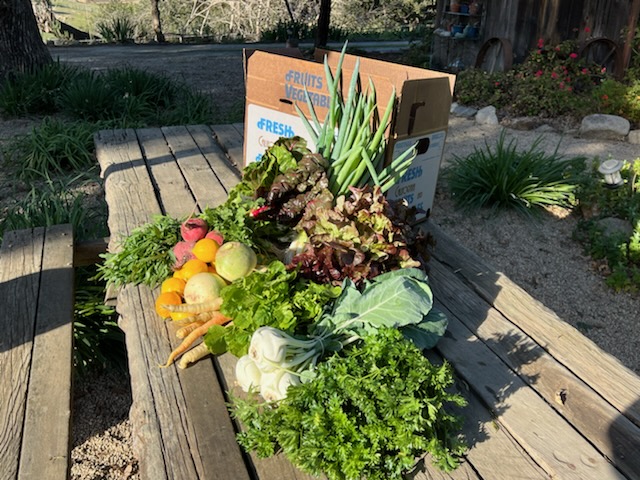
Hi Mariquita supporters,
We’ve been busy planting, weeding, and chasing the birds away from our baby seedlings and now we can plan our deliveries. We will begin packing our boxes in April. It’s always a bit of a mystery what will be ready in time for each week’s pick list, but there’s little mystery as to how we will go about distributing our veggies, fruits, flowers and herbs this year. Here’s our new setup:
For harvest year 2022 we are choosing to do staffed deliveries at a few of our pickup locations. This means that you will order as usual on-line to receive items for pickup. Then, on the delivery day, there will be a two-hour window for pickup from one of our team members at the pickup location. The pickup window for all these staffed deliveries will be from 4-6pm.
Look for additional items on the truck for sale. All sales can be done through Venmo, Zelle, cash or check (at pick up) at no additional charge and PayPal for an additional $2 per $25 spent.
We will continue our drop-offs at non-staffed Santa Cruz and Aptos pickup sites every other week on Tuesdays, starting March 15th. Those deliveries are starting, and we are taking orders now for the Tuesday, March 15th pickup.
CURRENT PICKUP SCHEDULES:
Santa Cruz and Aptos deliveries: These drop offs will begin on Tuesday, March 15th and will happen every other week.
Pick up windows: Santa Cruz – Noon-5pm and Aptos from 11-7pm.
Starting on Thursday, April 14th, we will be popping up twice a month at Piccino restaurant in the Dogpatch neighborhood of SF, Pick up window 4-6pm.
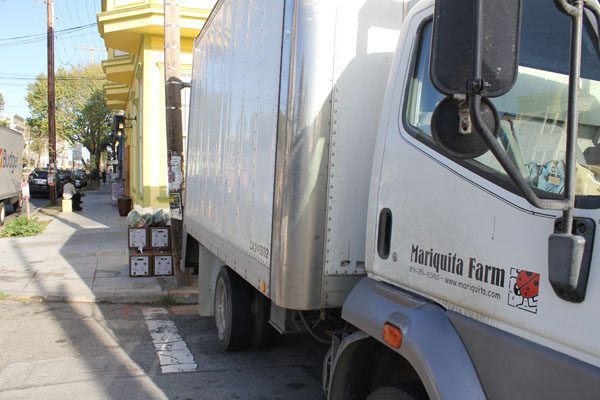
Starting on Thursday, April 14th, we will be doing a drop off delivery twice a month at our Los Gatos location, Pick up window Noon–8pm.
Starting on Thursday April 21st, we will be delivering twice a month to our Berkeley and Palo Alto Sites, Pick up window 4–6pm.
Once the shop pages open, the orders can be placed. All orders close on Sunday at 6pm for pickup the following week.
We are also planning to host a series of “Tomatopalooza” events and, new this year, we will be a holding several “Special Events” on our farm in Watsonville. Keep an eye on the newsletter for details!
Birds, butterflies and excitement are in the air and we look forward to bringing you a full basket of Mariquita love and vegetables this season!
Thanks,
Andy and all of us at Mariquita Farm
© 2022 Essay by Andy Griffin.
Photo by Starr Linden.
Get Ready…Get set…Go is coming soon!
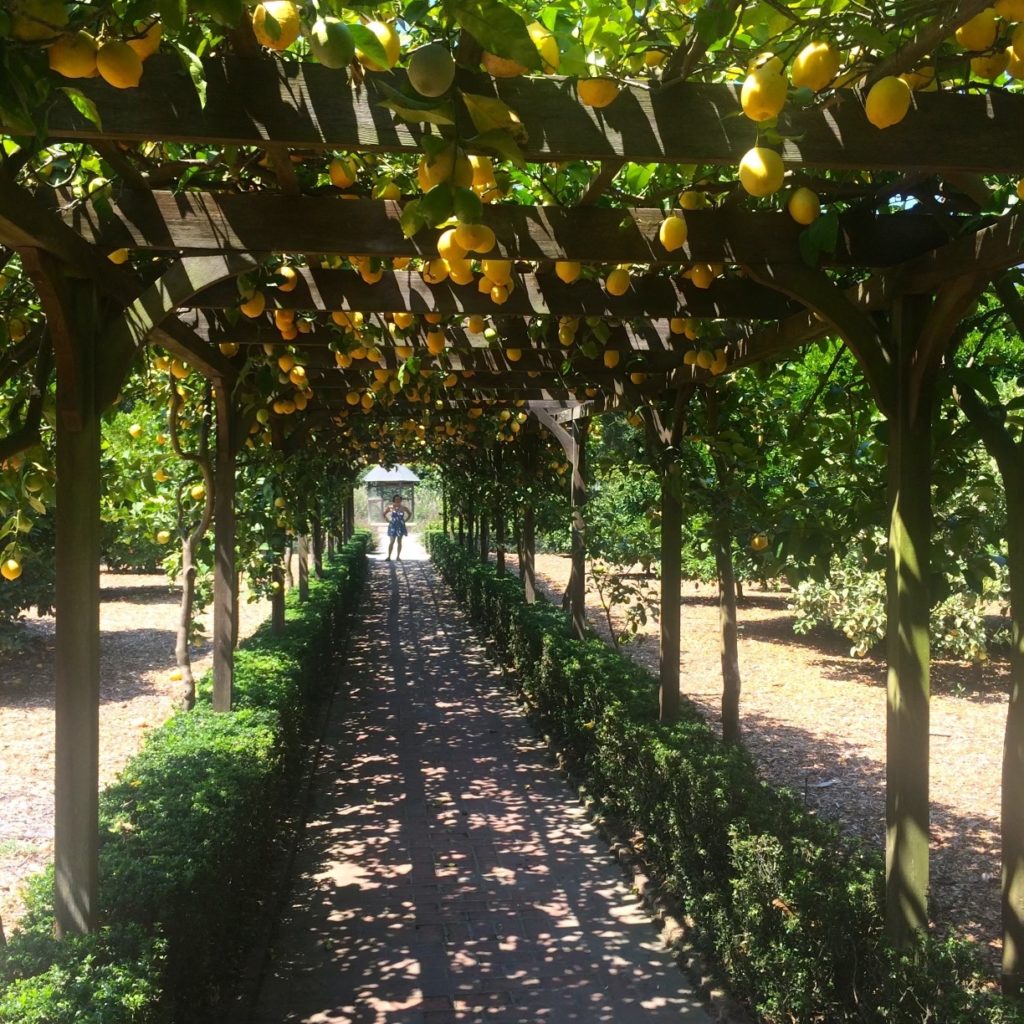
The lemon arbor at Ganna Walska Lotusland in Montecito.
Life gave me lemons…But this isn’t an essay about me making lemonade. In fact, if I take personal responsibility for my circumstances, I should say, “Life gave me many privileges, opportunities, and learning experiences yet, despite those advantages, I chose to plant lemons.” More specifically, little by little, I’ve planted over 120 citrus trees, including 30 Meyer and 30 Lisbon lemons, plus an assortment of Bearrs limes, Thai Makrut limes, Yuzu limes, Ranpoor limes, Australian Finger limes, Buddha’s Hand citrons, Etrog citrons, and a scattering of Kumquats, Limequats, and orange varieties. The jury is still out as to whether or not the orchard was a good idea and on icy, winter nights I worry. If my fruit project doesn’t go sour I’m sure I’ll claim that I had a clear idea of what I was getting into and I executed my plan with precision and alacrity. In case my citrus scented dream ends in failure I’m already practicing my rationalizations. “I was seduced by art,” I will say. Or I can blame the Union Pacific Railway and Republican Party Politics. Or maybe I was doomed and my genetics betrayed me. Genetics are a good place to start.
After he stepped off the boat from Copenhagen and cleared Ellis Island my Great Grandfather Marius took a train to Minnesota because back in the late 1800s that’s where the Squareheads went. I’m told that after Great Grandpa arrived in Minnesota he wrote a postcard back home to the family. “This place is even worse than Denmark,” he said, referring to the cold wind, rain and snow of the upper Midwest in winter. It didn’t take Marius long to catch a westbound train for sunny California, and that’s how I came to be here on the Central Coast today. It’s not hot enough here in Corralitos to produce fine quality oranges, mandarines, or grapefruit, but we do enjoy a nice climate for lemons and limes. And, compared to the boggy, foggy little island in the Baltic that my family came from, this place is practically Ibiza. I’ve never been high on snow and ice so I have to imagine that whatever kink in his DNA that prompted my Great Grandfather to abandon the lands of his forefathers for sunnier latitudes got passed on to me and so I share his taste for the warm sun on my back.
My farmer friend, Annabelle, gave me a book by Helena Attlee titled “The Land Where Lemons Grow.” It’s a great book, well written, and full of history about Italy, food, the citrus industry and popular culture. There is even some practical information about growing citrus that is cleverly disguised by an entertaining delivery. The author is British and her book is infused with the same romantic attachment to the warmth of the sun that animated my Great Grandfather. When I visited the lovely gardens at Ganna Walska Lotusland in Montecito it all came together for me. There is a splendid lemon walk in Lotusland where trellised lemons cover an arched passage so that you are shaded by the foliage from the hot sun as you pass beneath. A luxurious display of beautiful yellow fruits hangs overhead and the refreshing scent entices you to reach for the lemons. Beyond the lemon arbor the Santa Ynez Mountains make for a magnificent backdrop. The scene looks for all the world like a page out of “The Land Where Lemons Grow” come to life. The old fashioned, colorful labels that fruit packers slapped on wooden crates back in the day come to mind too, with rows of green trees pictured in the foreground, bearing golden fruit, with blue skies overhead, dramatic mountains on the horizon, a Mediterranean style villa on the side. And there’s usually a frolicking young woman pointing to an inviting brand name like Sunny Cove, Wood Lake Nymph, or Sea Side.
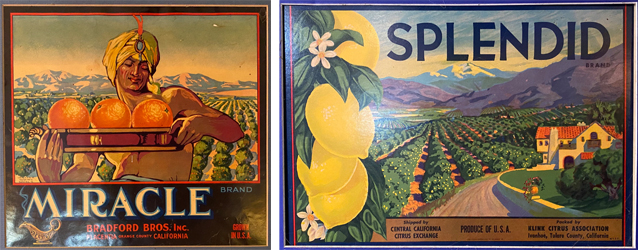
The dreamy fruit box labels were no accident. During the Civil War Lincoln and the Republican Party sought to unite the west and east coasts by linking them with railroads. To stimulate the construction the federal government granted the Union Pacific Railway and the Central Pacific every other square mile of land along the proposed rail routes so that the companies had assets to leverage for loans from European banks. With the backing of the capitalists they began construction and to promote their new railroads they advertised the virtues of the western lands that they were opening up for development. The Egyptians may have invented math, the Greeks invented pizza and the Hebrews invented monotheism, but the Americans invented mass marketing, and in the promotion of the railways and the settling of the southwest no holds were barred and no exaggeration was too shameless. PT Barnum ought to be our patron saint. The lure of sweet oranges and tangy lemons- a virtual Garden of Eden simply waiting to be populated- was heavy juju for the poor, shivering northern Europeans and they came pouring out of Scandinavia, Germany, Poland, Ukraine and Russia. My great grandpa was one of millions.
As soon as my atavistic dreams (or illusions) of a sunny, citrusy, Edenic garden were awoken by Lotusland and Helena Attlee’s writing I began planting. An excellent citrus nursery, Four Winds, is just around the corner from my home so sourcing the plants was easy. I took note of the ground that I’ve got that is south facing so that it enjoys the most sun. I measured out the slopes because I know that cold air sinks, causing a slight breeze which can be just enough to keep frost from settling as it does on bottom ground. I staked the space, stretched out the drip tubing for irrigation and planted. I went in with my neighbor, Zea, from Fruitilicious Farm, and bought copious amounts of organic citrus fertilizer. I cloaked the trees with frost protection fabric when the cold threatened and I pruned and shaped the trees as they developed. Now the first harvests are here and there’s WAY more fruit than I could ever use. Things seem to be starting successfully so I need to make this essay about YOU making lemonade- or lemoncello, or lemon tarts, or lemony salad dressing, or all of the myriad of other recipes that feature lemons. And obviously, we haven’t stopped growing all of our other vegetable crops. The season is stirring to a start and we will send more specific information on our delivery schedule next week.
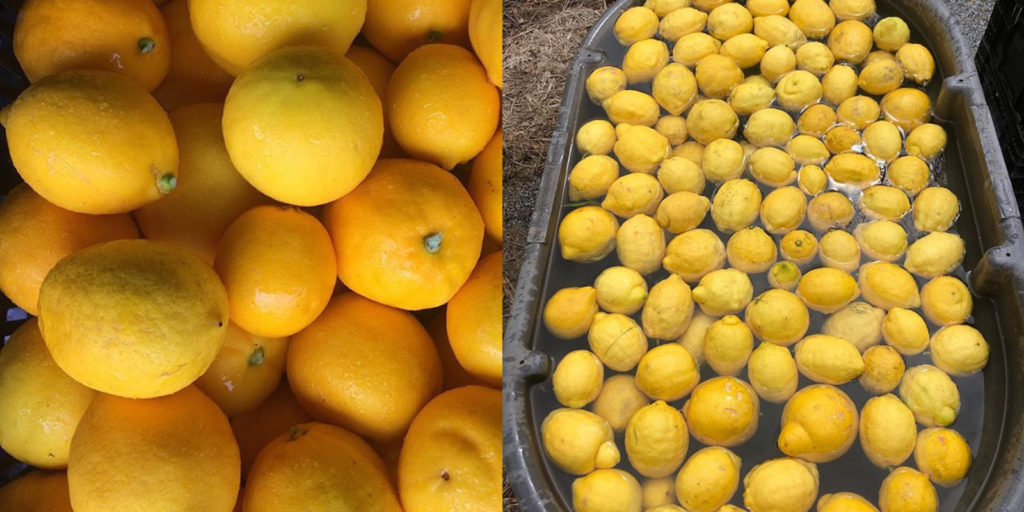
Meyer and Lisbon Lemons
Thanks,
Andy and all of us at Mariquita Farm
© 2022 Essay and Photos by Andy Griffin.
Photos of Fruit Packing Labels courtesy of Zea Sonnabend.
Maybe I’m Amazed
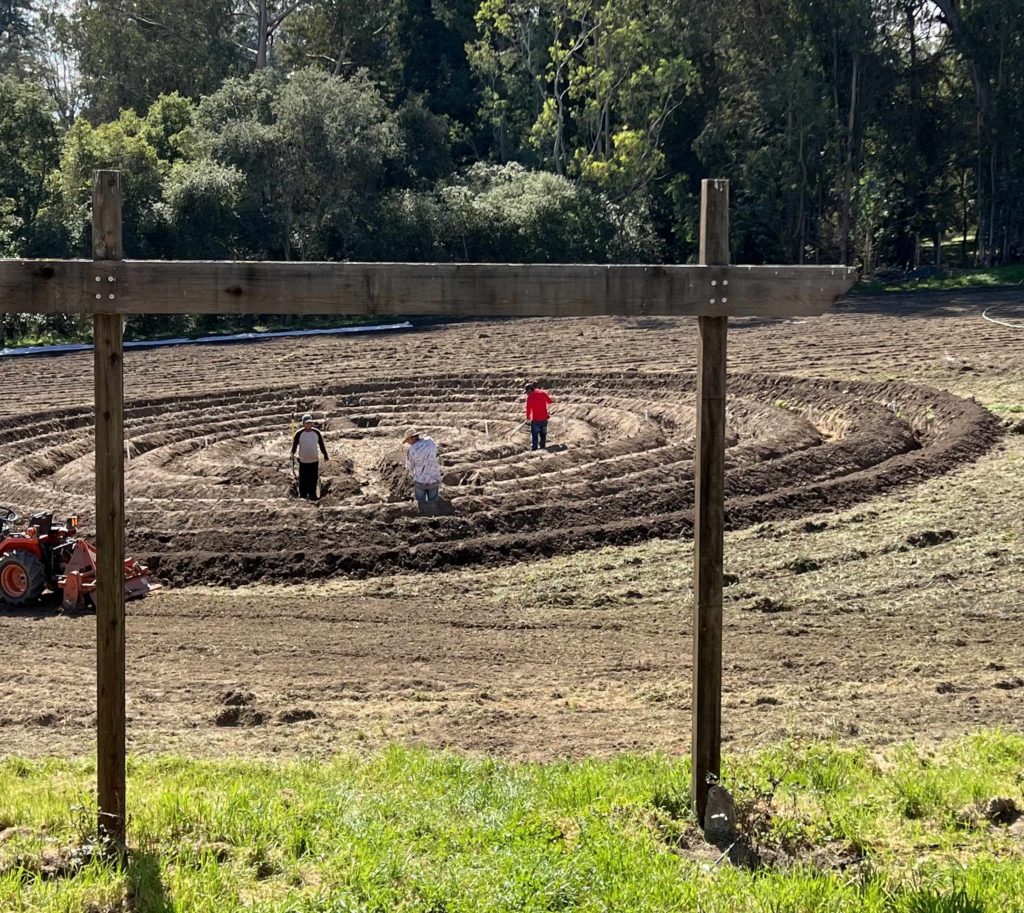
The very warm, almost hot, afternoons that we’ve been having this past week could lead a person to believe that we’re already enjoying summer. I was on restaurant deliveries in San Francisco last Thursday and I got my first request of the season for basil from a chef. Since I was double parked on California Street with a swirl of traffic around me I couldn’t take the time to explain that basil is a tropical herb that evolved in South East Asia. We must wait until the soil warms enough so that any basil seeds we plant feel at home and sprout with joy instead of sadly rotting away in the cold mud. As consumers it’s natural to feel the warm sun on our backs and feel aroused for a taste of basil pesto, but as farmers we can’t let our appetites dictate our planting schedule. It’s only February! Once the sun goes down the temperatures fall fast. As the sky darkens we see Taurus, the Bull, high in the sky. In April, when Taurus is sinking into the western horizon at sundown, we will know that spring is here and that we can safely plant basil outdoors without worrying about frost. But next week we will sow trays of basil in our greenhouse so that we can get a jump on summer by transplanting out little tufts of basil seedlings on April 15th.
Maybe Taurus, the bull, is on my mind because we’ve been creating a labyrinth on the farm and planting it with lavender, and we’re making real progress. The Minotaur, you’ll recall, was the monster with the body of a man and the head of a bull who was imprisoned in a labyrinth in Crete. Today we would say that, properly speaking, the Minotaur was imprisoned in a “maze.” The two words, “maze” and “labyrinth,” have been used carelessly or interchangeably at times in the past, but today we understand a maze to be a puzzling construction, full of blind alleys, dead ends, and troubling forks in the paths- like the maze that Theseus threaded his way through when he went to slay the infernal bull headed man. But a true labyrinth has but a single path. True, as you walk a labyrinth your path may loop around and appear to take you away from reaching the center, but if you keep going down the path, you will get to the heart. We are planting beds of lavender between the pathways of the labyrinth that we are constructing, and in time these plants will form a hedge. Last season my partner, Starr, harvested lots of lavender and dried it to use and sell and as this crop grows we will have even more. But why create a labyrinth?
Maybe I’ve just been planting crops in straight lines for my whole adult, professional life and I want to color outside the lines for a change? As a farmer I’ve always understood that farming is different than gardening. As I experience it, gardening is about beauty. Gardening is meditation. Gardening is art. Gardening is a release. Gardening is play. And farming is about money. Nobody pays a farmer to meditate, create art, play, or experience release. People need food at a price they can afford, so if you’re going to stay in business as a grower you need to take whatever measures you can to bring your crops to market at a price that will generate the sales you need to get the money needed to pay the farm’s bills. This reality is as old as God. If you read the Book Genesis you’ll see that we were kicked out of the Garden of Eden for the sin of eating the fruit of the Tree Of The Knowledge Of Good And Evil and condemned to farm. “Cursed is the ground for thy sake,” said God. “In sorrow shalt thou eat of it all the days of thy life; Thorns also and thistles it shall bring forth to thee….” etc. In April, when the basil sprouts with joy, so will the thorns and thistles in the field. Farming is work. Maybe I just want to play. Or maybe I’m amazed.
In Old English to amaze meant to bewilder or confound and the root word, “maes,” is cognate with our modern word “maze,” which accurately describes the devilish Cretan prison that confined the Minotaur. There is certainly plenty to be “amazed” about these days, from the bewildering climate crisis to our political dead ends to the smog of ignorance and disinformation that contaminates public discourse. If you live in an online world where you’ve had your life upended by stock market turmoil or the kinks in the supply chain, or if you’re working from home and sick of it, then a life outdoors, farming in the fresh air, might seem like a great alternative. But that would be gardening, lol… We farmers have had our lives upended too over the last several years of the Covid pandemic. Last year, for the height of tomato season, the packaging suppliers didn’t have cartons and we really had to scramble. Thank you all for returning the boxes after you canned your tomatoes- that REALLY helped us. By the end of last year’s growing season I felt pretty much out of gas, and I’ve looked at our labyrinth project as a therapy. Don’t forget, the difference between a maze and a labyrinth is that a labyrinth has a single path, even if it is convoluted, and if you stick to it you will reach the center. And who doesn’t need to be centered these days?
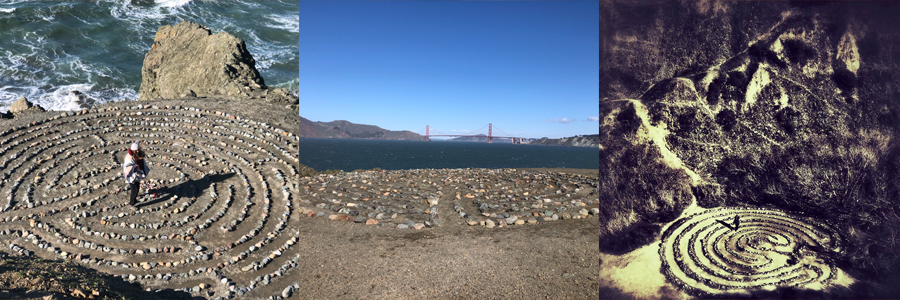
The Labyrinth has been a slow process because we can only work on it when we don’t have other, more pressing farm chores to complete, but we’ve been plugging away for some time. For our “staycation” the first Covid winter Starr, and I visited a number of local labyrinth constructions. Oakland’s labyrinth in the Sibley Volcanic Preserve was an inspiration, as was the labyrinth in San Francisco near the Presidio on the water. This past winter Starr and I visited a labyrinth in Houston, Texas, just down the block from the Rothko Chapel, and another in Tucson at the Arizona-Sonora Desert Museum. We came home energized to get back to work on our labyrinth, and the warm, dry weather has given us an opportunity to make a lot of progress. We’re hoping that sooner or later Covid will pass, and we can invite you to come visit the farm, walk the labyrinth, and enjoy the farmscape that your patronage and support is helping to create. And for any of you who don’t want to feed the spirit by walking in circles we’re still planting crops in straight lines to feed the body too. Onions, lettuces, carrots, greens and herbs are growing in the greenhouse already, and right now we’ve got tomatoes started in trays for transplanting out in April when the wintery Bull has left his nighttime pasture.
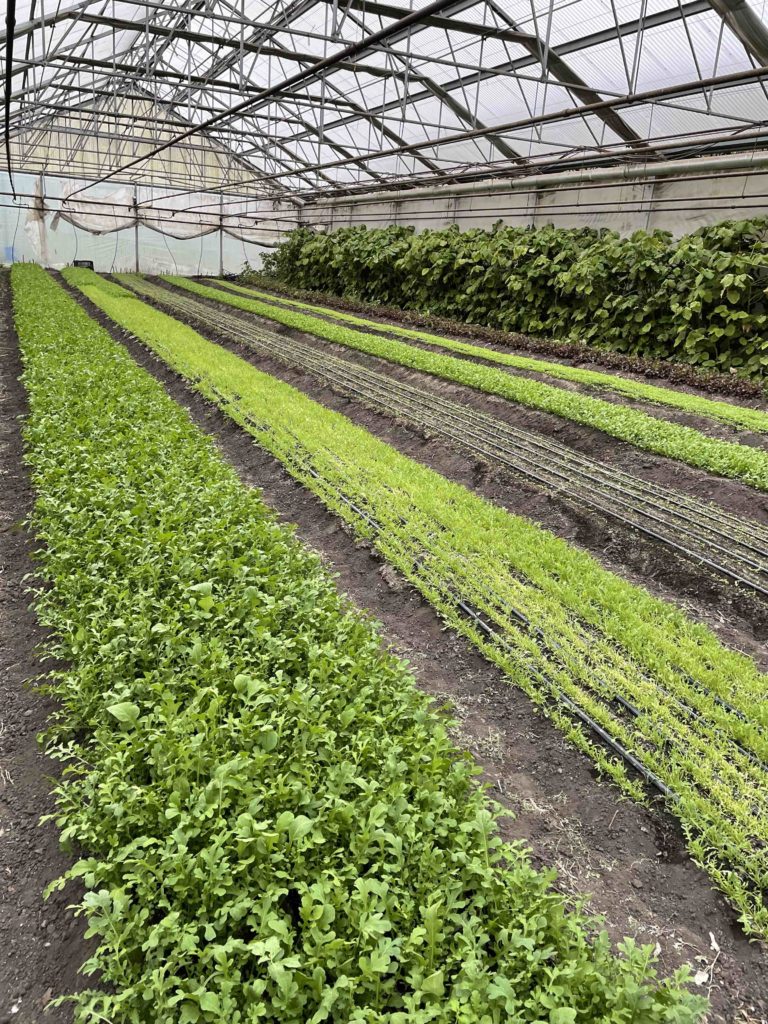
Our 2022 goal is to be up and operating a pop-up event each week starting in early April and to augment that outreach with a number of on-farm events in the summer and fall. Keep an eye on the newsletters and we will keep you posted on developments and opportunities.
Happy New Year, be well, and we will see you soon.
Thanks,
Andy and all of us at Mariquita Farm
© 2022 Essay by Andy Griffin.
Top photo of labyrinth by Starling Linden.
Row of photos of Oakland and San Francisco labyrinths, and photo of arugula in the greenhouse by Andy Griffin.
Creative Evolutions
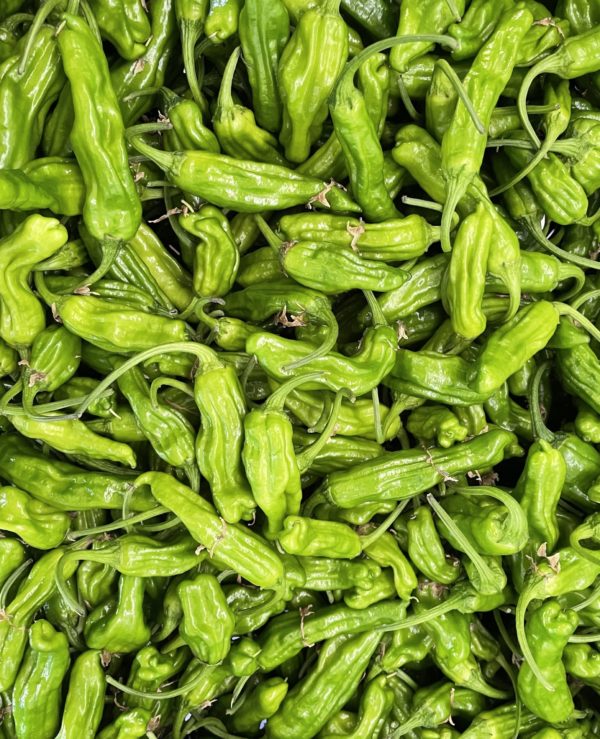
Borders are interesting places. Yes, borders divide people into one side and the other side, but borders are also places where different cultures make contact. Misunderstandings abound along frontiers, but so do creative evolutions. The Pacific ocean has acted like a vast border but it has also been the connective medium between the Americas and Asia, and this week’s harvest box underscores that relationship. Take the shishito pepper, for example.
We think of the shishito as a “Japanese pepper” — I get my seed from Kitazawa Seeds, in Oakland, a company that specializes in Asian vegetable varieties — but a botanist will tell you that everything about peppers are American in origin, except the name. Columbus had investors who financed his voyages to the “Indies.” He couldn’t afford to disappoint the powerful people who placed bets on his dream. Vast profits were going to be realized by crossing the Atlantic from Western Europe to India and returning home with cargoes of Piper nigrum, or Black Pepper, deftly cutting the Muslim traders out of the spice trade by making their overland routes from Asia irrelevant. So when Columbus careened into seas and lands that were new to him, a new world devoid of even a single grain of Black pepper, he had to talk fast. The locals got called “Indians” and the spicy fruits that they cultivated got the name of “peppers.”
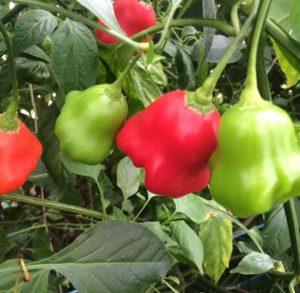
Habanero peppers
Back in Europe, the people were hesitant to accept this hustle and the new “peppers” only gained acceptance slowly, which is not surprising considering the ignorant and religious context of the age. Any plant not mentioned in the Bible could reasonably be defined and feared as “Satanic.” In today’s marketplace, we have a myriad of different kinds of peppers available, from the tame Bell pepper to the fiery Habaneros, but it’s worth remembering that every basic form of this widely variable plant had already been developed by the Native American farmers. Asian cooks didn’t have the same prejudices as their European counterparts and the new American “peppers” found a ready place in the kitchen. The Japanese are not known for their dependence on picante flavors and they adopted a mild type of immature, green pepper as their own, selecting and improving it to make it conform to their tastes, dubbing it the “shishito.”
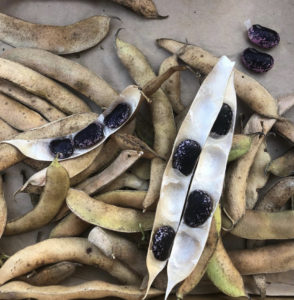
Akahana beans
A similar dynamic occurred with the runner bean. Beans, like peppers, tomatoes, potatoes, sunflowers, corn and squashes, were originally developed by Native American farmers. The “old” world had pulses, like peas, lentils, garbanzos, and soy, but they did not have the Phaseolus beans like the Kidney bean, the green bean, or the runner bean. Compared to many other legumes, runner beans prefer a cooler environment to grow in. The cool highlands of Central America, from Oaxaca down through Guatemala, were home to a tribe of rambling, scrambling, climbing, vining beans now known as “runner beans.” The Scarlet runner bean earns its name by virtue of its brilliant scarlet flower. It has a white flowered cousin known as the white runner bean. These beans found favor among Japanese farmers due to the large size of their seeds and their mild flavor and velvety texture once cooked. The Japanese selected and improved the new American beans to suit their taste, and called the purple seeded form the “Akahana mame” and the white seeded bean the “Shirohana mame.”
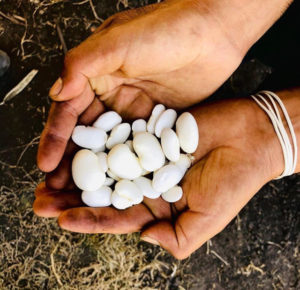
Shirohana beans
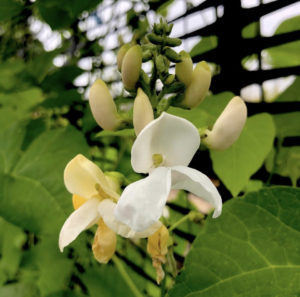
Shirohana flower
Thank you for your support this season. We’ll be closing the farm down for a bit to rest, regroup, and come up with a new business plan. Work will not stop during our shut down, but Starling and I will be down on a border ourselves, visiting Organ Pipe National Monument on the Mexican border to see some cacti, dropping in on the Everglades to visit with family and see some alligators, and hopefully even venture out to the Florida Keys and the Dry Tortugas National Park to gaze out across the Caribbean and make plans for the future.
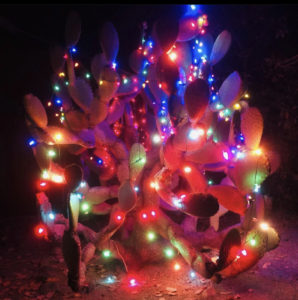 We wish you happy holidays and a healthy, peaceful winter!
We wish you happy holidays and a healthy, peaceful winter!
Andy and the Crew at Mariquita Farm
Cultivating Luck
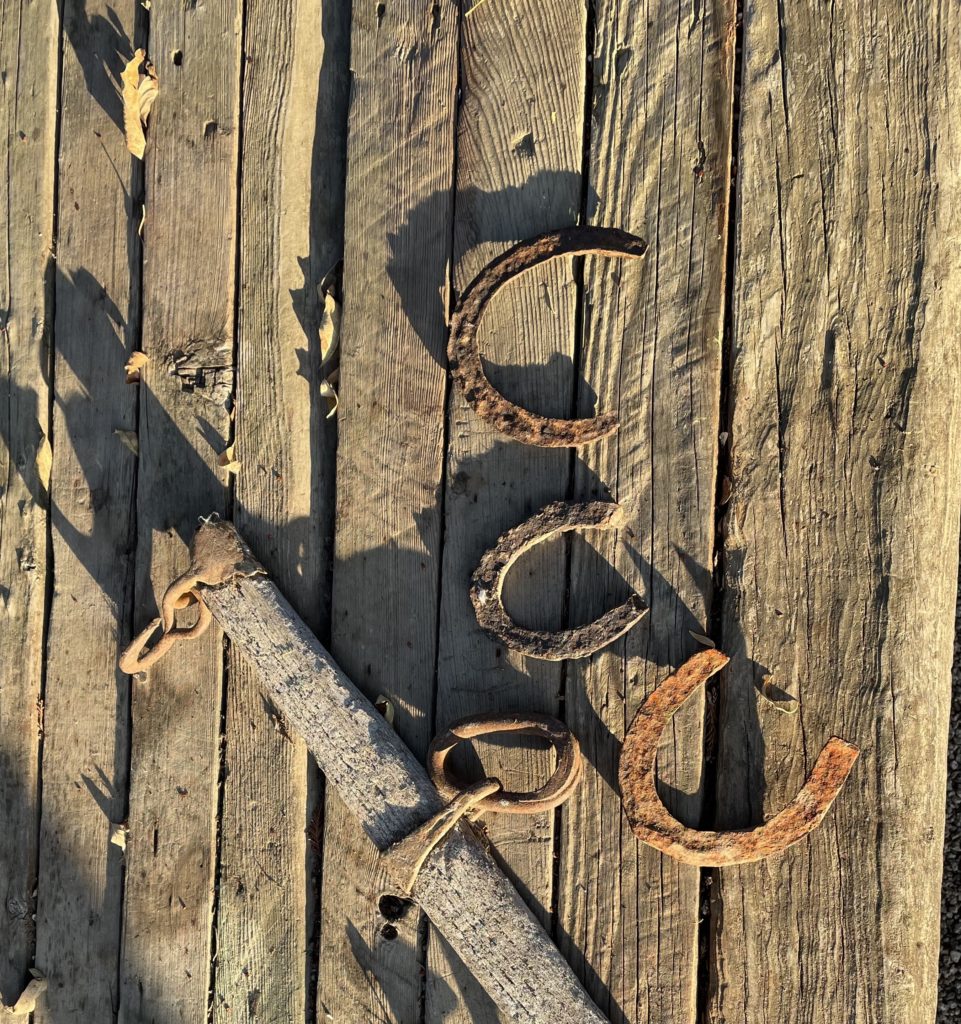
We’ve turned up three rusty, old horse shoes as we’ve gone about getting the “windmill field” ready to plant next spring, so does that make us lucky? I think so. Consider the facts:
My Great Grandfather Griffin farmed this field during the earliest years of the 20th century and the horse shoes were undoubtedly shed by his draft horses. My uncle told me once that the family had a contract at that time to grow cucumbers for Heinz pickles. They probably got a good crop because the soil is rich. They probably didn’t get a good price though, because my Great Grandfather ended up selling the field to Marius Jorgensen, a Danish immigrant who worked as a bricklayer in town. But, as luck would have it, during the sale my Great Grandfather’s son met Marius’s daughter, Anna, and the two youngsters got married, so the field stayed in our family even after the rest of the original Griffin ranch got sold off to pay debts, and eventually I was able to buy the land from my Uncle.
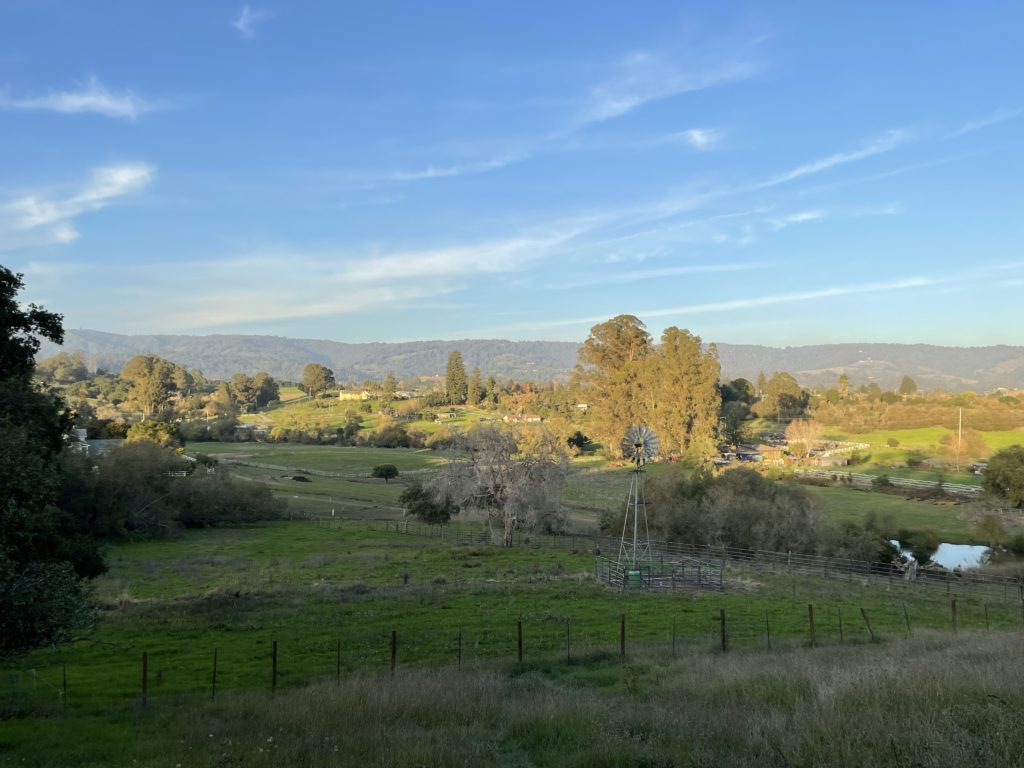
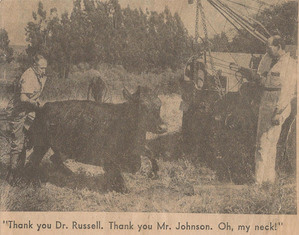
Clipping from the Register Pajaronian (circa 1955) showing Grandma Anna’s cow rescued from the well.
During the years that my Danish Great Grandpa had the land it was leased at one point to a flower grower who produced Calla lilies, and there are some feral lilies that still thrive in the edge of the field where a seep spring keeps the ground wet. There’s another spring under the windmill. My Great Grandpa Marius dug that spring out and he built a brick-lined spring box with a windmill above to lift the water to the surface where it filled a water trough for livestock that grazed the ground after the flower farm moved on. In the mid 1950s my Grandmother’s cow fell down into that well. A tow truck was able to haul the cow out, which was lucky, but Grandma ended up in the local news over that incident when a photographer for the Register-Pajaronian snapped a picture of her with the distraught cow hanging from the tow sling. Sudden fame made Grandma cross, because she’d never sought celebrity.
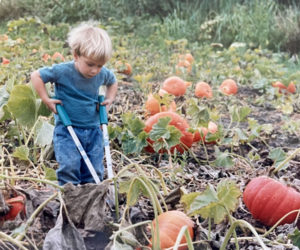
Graydon harvesting pumpkins 20 plus years ago.
I grew pumpkins and beans in this field in the late 1990’s and these crops did well. When I turned my attention to farming larger sections of leased ground, I put the field back into pasture for my donkeys. With a much smaller business these days, and much higher ag land rents to choke down, it makes sense to farm the field again. So, even as we wrap up all our work for the 2021 season, it’s already time to be planning and prepping ground for the 2022 season. The donkeys have been moved to the next field over and I put up a sturdy fence yesterday to make sure that they stay there. Like my Great Grandpa, I’ll plant some cucumbers, but I’m also planning on raising some beans. And not just any beans! These will be vining, “Jack and the beanstalk” style, “lucky” beans that can send runners climbing 20 feet high if they can find something to scale.
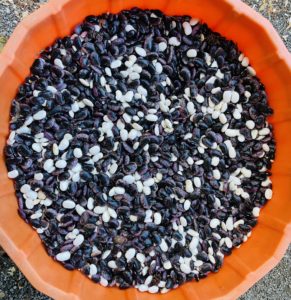
Akahana and Shirohana beans.
Our 2021 experimental bean crop at the land I farm along Freedom Blvd was a success. A successful experiment means that you learn something and, even a trial crop “fails,” the crop is still a success if you learn something. The beans I grew on rented ground were the purple Akahana mame and white Shirohana mame beans – Japanese selections of a runner bean that is native to the Oaxacan highlands. These are the same beans that I grew in this field when my son was a little boy. This year I found a ready market for the small crop of beans that I produced and I calculate that if I don’t spend so much money on rent next year then I can maybe even profit a bit if I grow a larger crop. Between the price of rent, poles, trellis wires, water and a lot of hand labor there are serious costs associated with growing runner beans, which is why you don’t see so many of them in markets. I’m lucky to have my own ground that I can plant into, and my own water to pump.
This past Saturday I was ready to winnow the beans I’d saved for our farm’s harvest box customers. It was warm and the bean pods were dried well but there was no breeze at all. So Starr plugged an extension cord in, strapped on her electric leaf blower, and took a turn as a new age Aeolus, whipping up a stiff wind to carry away the chaff from the stream of beans that fell as I poured them from one barrel into another. We will select some of these beans to plant next spring, and the rest we will put in this 2021 season’s last harvest box.
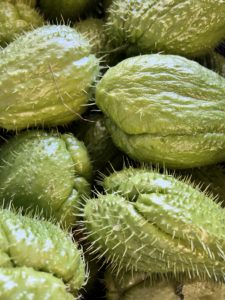 Another successful experiment this year was our Chayote crop, so I’ll be building a frame for a larger planting that will cross the windmill field. When our experimental chayote crop came in with a larger yield than expected Fidel, our foreman, sold the extra chayotes to the crowd of Oaxacan women who gather at the laundromat his wife frequents. The Oaxacan women were very clear; they were excited to get such fresh produce and they asked us to grow Chilacayotes too. Chilacayotes are sprawling plants, so we will put them below the chayote frame towards the end of the field where they can occupy as much space as they want. The thick canopy of leaves that the chilacayotes produce will act to discourage weeds.
Another successful experiment this year was our Chayote crop, so I’ll be building a frame for a larger planting that will cross the windmill field. When our experimental chayote crop came in with a larger yield than expected Fidel, our foreman, sold the extra chayotes to the crowd of Oaxacan women who gather at the laundromat his wife frequents. The Oaxacan women were very clear; they were excited to get such fresh produce and they asked us to grow Chilacayotes too. Chilacayotes are sprawling plants, so we will put them below the chayote frame towards the end of the field where they can occupy as much space as they want. The thick canopy of leaves that the chilacayotes produce will act to discourage weeds.
Along the soggy margins of the field where crops won’t grow we’re going to plant redwood trees. Starr and I have a program of planting some redwood trees every year as a gesture to the future. We’ve planted 15 of them so far. We usually buy a live redwood for a Christmas tree and then plant it out when the holidays are over, but every time we see a reasonably priced tree in a nursery we buy it. Long before my great grandfathers were here this land was a dense redwood forest, and it feels good to be replanting some trees. Since we’re planting the trees on the north side of the field they will never shade the field, but they will offer the field some wind protection. Besides, the earth needs help with CO2 and redwoods are great carbon sinks. We are lucky people to be living here and farming this ground, so planting redwood trees every year seems like an appropriate Christmas gift back to this land that has given us so much.
 And speaking of gifts, if you are looking for a stocking stuffer…
And speaking of gifts, if you are looking for a stocking stuffer…
Persimmons

Mr Raccoon leaves big dirty foot prints on the stairway.
It was the thump overhead that woke us up, followed by violent sounds of thrashing and scraping. From my warm, cozy nest in the bed below it seemed as though an inebriated Santa Claus had just crashed his sleigh into our chimney and now the reindeer were tangled in their harnesses and scrambling for footing on the steep roof. I was befuddled and drowsy but it’s only early November so in my rational mind I knew that the scandal on our roof couldn’t possibly be a consequence of Christmas. “The persimmons must be ripe again,” I decided; “They’re sure an attractive nuisance.” Dissing fruit isn’t a popular stance for a farmer to take, so let me clarify myself by first spelling out what makes persimmons so attractive before I dig into what makes them such a pain.
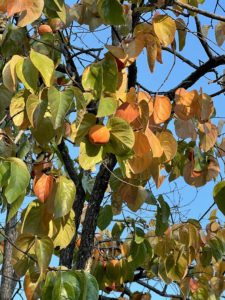
Hachiya Persimmon Tree
Persimmon trees are beautiful, and the rich, deep orange and red hues that their leaves take on in the late fall are as close as we Californians can get to “fall colors.” I remember working on a farm in the Sacramento Valley when I was 20 years old, and one grey, cloudy autumn day we were sent to pick persimmons. There had been a storm the night before and the wind and rain had knocked all leaves to the ground so the fiery, heart-shaped fruit hung from the wet, black branches like jewels- a sight so stunning that I’ve never forgotten it. These were the Hachiya persimmons, the kind that ripen to a slippery, pudding-like goo that is almost obscenely sweet. Another popular persimmon variety is the squat shaped, dusky-orange Fuyu, which has more of an apple-like texture when ripe.
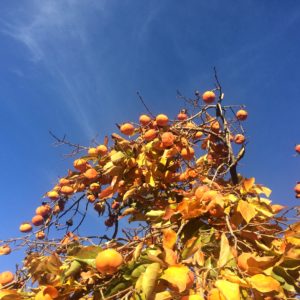
Fuyu Persimmon Tree
When I finally studied up on persimmons I was surprised to learn that the plant is in the same family as the Ebony tree. It takes a persimmon tree a hundred years before it develops the black, tightly grained wood so characteristic of ebony, so it is not a major commercial hardwood but its fruits are appreciated across Southwestern Europe, Asia, and America. Two Japanese persimmon varieties, the Hachiya and the Fuyu, are the most commonly cultivated types available to American shoppers, but interestingly our name for these Asian plants comes from the native American Powhatan word pasiminan, or pessamin. A number of different persimmon species are native to North America, ranging from Connecticut down into Northern Mexico. There are plenty of people who gather and eat the native persimmon types but the American persimmons don’t yet get the shelf space in supermarkets that the Hachiya or Fuyu varieties command.
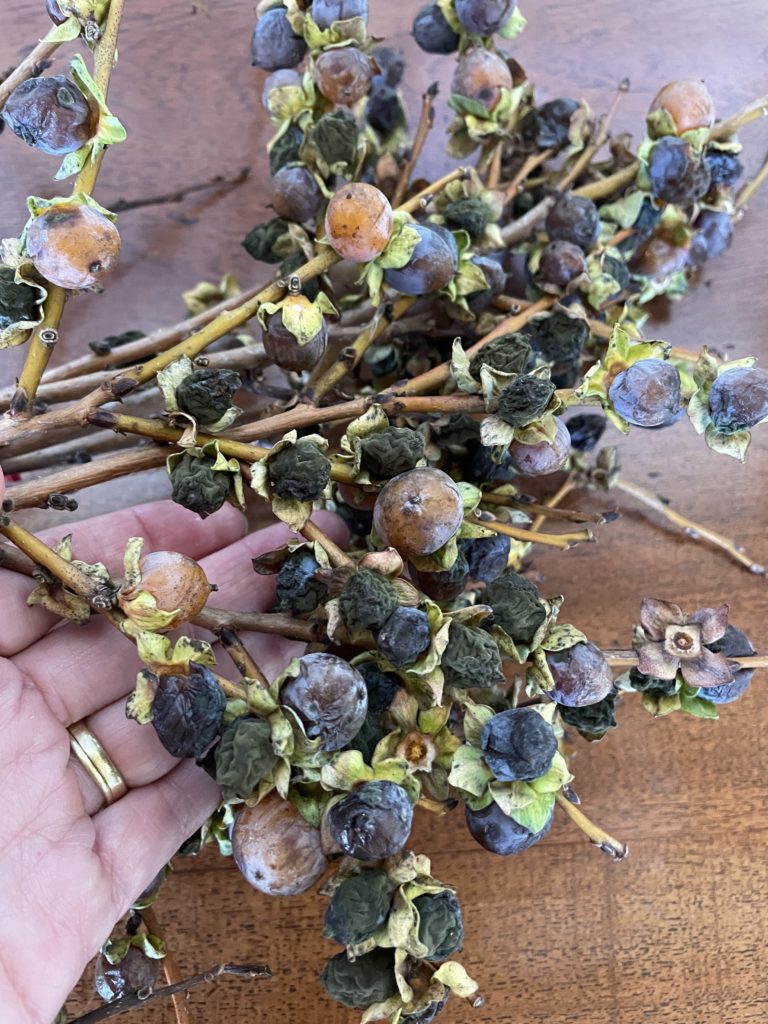
Wild Persimmon are much smaller than the Hachiya and Fuyu varieties. You can eat them off the branch once they’ve turned dark, wrinkled and raisin-like.
Plant scientists have discovered that the germination rate for persimmon seeds goes up dramatically if the whole fruit first passes through the gut of a zoo elephant leading some researchers to speculate that the American species evolved in companionship with the ancient megafauna like the Wooly Mammoth. Now that the Wooly Mammoths can only be found frozen in the tundra or mired in the La Brea tar pits it appears that their taste for persimmons has been taken up by lesser fauna, like the raccoon, which brings me to the nuisance part of this story.
My grandparents planted two persimmons next to our house back in the late fifties, one Hachiya and one Fuyu. These trees frame our home and shade it during the warm months of summer. We live in the country so we share our space with raccoons whether we want to or not. Some mornings we see their muddy footprints on our porch marking where they’d shuffled around, peering through the French doors at us while we were sleeping the night before. But during the fall when the persimmons ripen the coons become overtly obnoxious. Each of our trees have hundreds of fruits hanging from the branches. You’d figure that with all that fruit we’d have enough persimmons for all of the critters and people to enjoy, but that’s not how things work out.
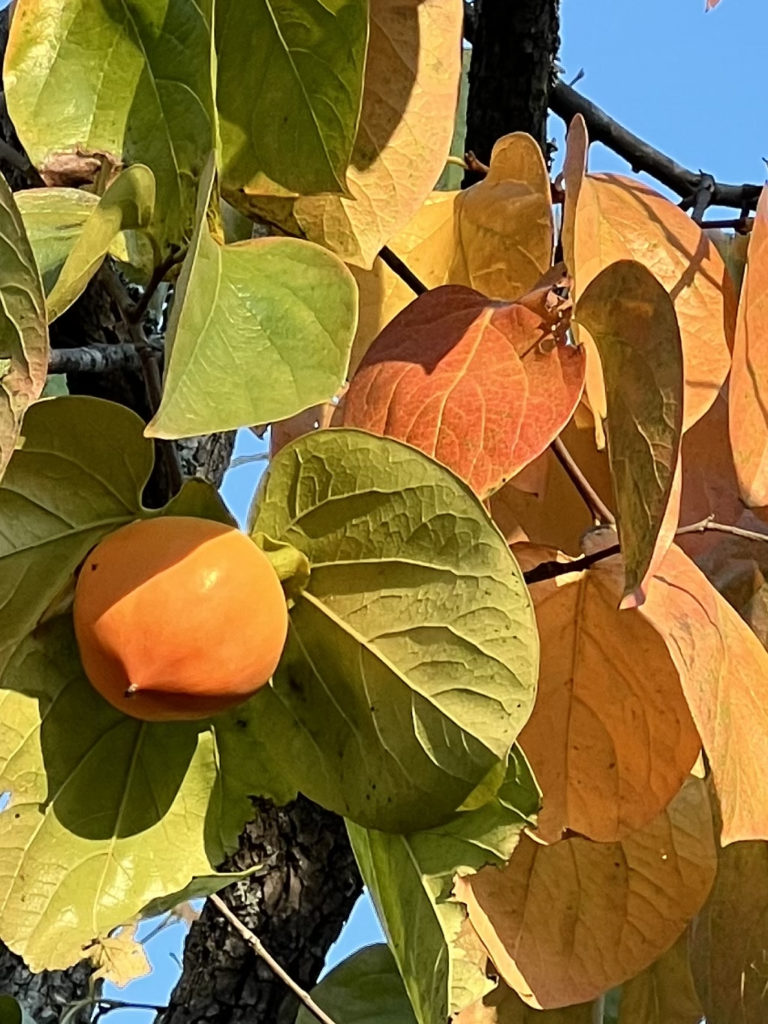 Mr. Raccoon was cute when he was a baby, but now he’s grown up into a big, stinky, brawling thug of a beast with needle sharp teeth. He never went to kindergarten so he never learned to share. He wants to hog ALL of the persimmons just for himself. His numerous cousins and uncles, ex-wives, lovers and children are similarly charm-free and they share his greedy appetite for sugary sweet fruit. As the persimmons begin to color up among the green leaves Mr Raccoon clambers up the tree trunks and strolls across our roof, checking first on the progress of his Hachiya crop and then giving his Fuyu trees a sniff. When he meets another raccoon, similarly bent on eating ALL of the fruit, the two coons snarl out a challenge and the fight is on to see who really owns the crop.
Mr. Raccoon was cute when he was a baby, but now he’s grown up into a big, stinky, brawling thug of a beast with needle sharp teeth. He never went to kindergarten so he never learned to share. He wants to hog ALL of the persimmons just for himself. His numerous cousins and uncles, ex-wives, lovers and children are similarly charm-free and they share his greedy appetite for sugary sweet fruit. As the persimmons begin to color up among the green leaves Mr Raccoon clambers up the tree trunks and strolls across our roof, checking first on the progress of his Hachiya crop and then giving his Fuyu trees a sniff. When he meets another raccoon, similarly bent on eating ALL of the fruit, the two coons snarl out a challenge and the fight is on to see who really owns the crop.
So we get our ladders out and we pick the crop. Otherwise there’s no sleep for us. Luckily, picking persimmons is a nice chore and reaching among the brilliant, orange and red leaves for the beautiful, glossy fruits is not anywhere near as onerous as picking lemons from amidst their thorny branches. And once the harvest is in the fun begins. Yes, if they’re ripe you can eat them out of hand. I especially enjoy eating the fresh Fuyu persimmons as I find the Hachiya almost too sweet. But I never have turned down an opportunity to eat persimmon bread or persimmon cookies. A lot of people enjoy making Hoshigaki, the air-dried persimmons that are such a favorite in Japan. Our friend, Jonathan, has made a tradition out of making hoshigaki. Below are some pictures which illustrate that process. Persimmons have more of a “moment” than a “season” so I hope you enjoy them while they last. And don’t worry about the Raccoon family — they’ve had their turn; now it’s yours.
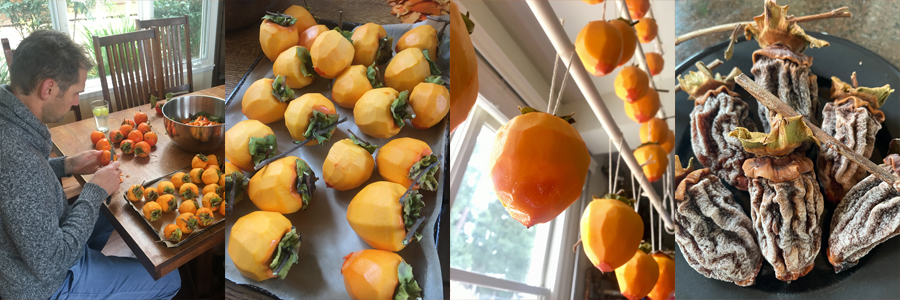
Happy Thanksgiving from all of us at Mariquita Farm!
Rain!
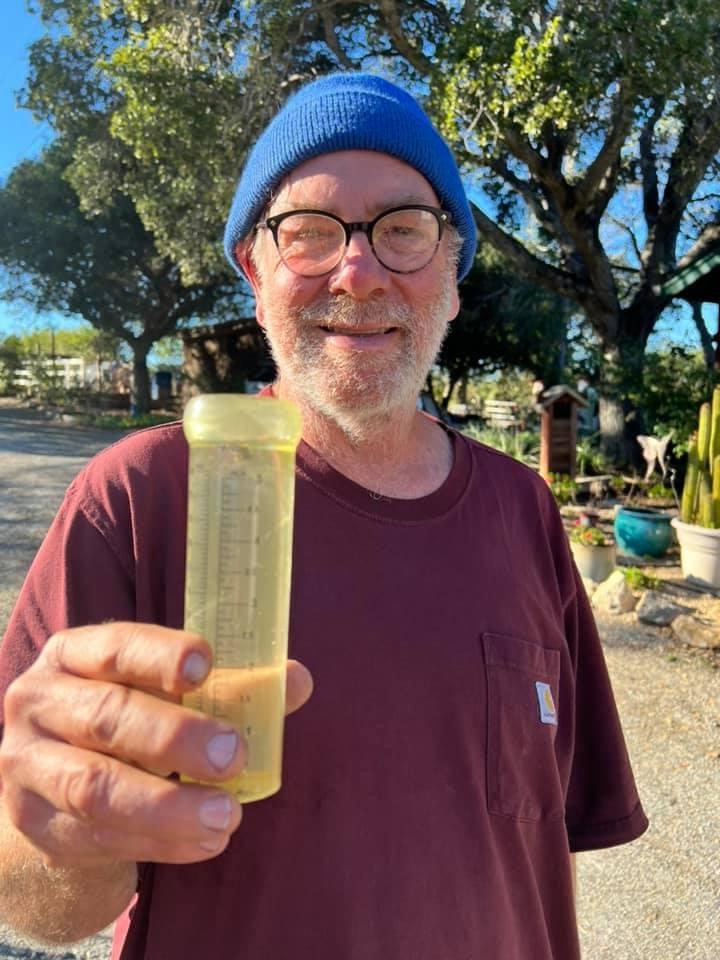
Hi All: We got a soaking rain last week with our six inch deep rain gauge overflowing before it could measure the total precipitation. With the ground now nice and moist the soil will begin to cool as the water evaporates. Typically, we get our first frost on the first nice, clear night after a big fall rain, when the nights are long and chilly. It’s overcast now, so it won’t frost immediately, but we need to get everything that’s vulnerable in the barn before it does hit.
I’ll be picking as many chayote as we have. I’ll put them in the share boxes until we run out, then switch over to potatoes. The soil blankets the potatoes, which have not yet been dug, so they’re protected.
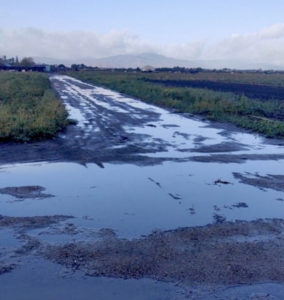 This is the last week of picking tomatoes too, I suspect. And peppers, though we will have some shishito a while longer as they are planted in the greenhouse. We’re busy in the greenhouse, but my next phone call is to the tractor repair shop because the seal on the Power Take Off /transmission seal just blew. That’ll have to get fixed before we can work more ground up under the roof. Luckily, we have a bunch of beds already prepped, so we shouldn’t be delayed too long.
This is the last week of picking tomatoes too, I suspect. And peppers, though we will have some shishito a while longer as they are planted in the greenhouse. We’re busy in the greenhouse, but my next phone call is to the tractor repair shop because the seal on the Power Take Off /transmission seal just blew. That’ll have to get fixed before we can work more ground up under the roof. Luckily, we have a bunch of beds already prepped, so we shouldn’t be delayed too long.
Thx A
Fire On The Mountain
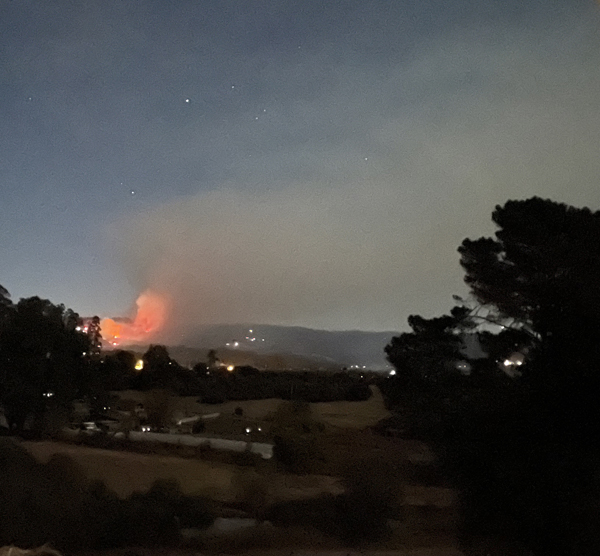
It was hot last Friday afternoon as I returned home from my produce deliveries to the Bay Area. As I turned the truck from Freedom Blvd onto Corralitos Road I passed the big wooden Smokey Bear sign and noted that the fire danger sign that he holds was red and said “high.” I was not surprised. Usually the sign reads “high” or even “extreme” from early June all the way until the first rains in the Fall bring some welcome moisture.
Have you ever met a celebrity? The biggest “name” I’ve ever encountered was definitely Smokey Bear- the real Smokey Bear- back in the summer of 1966 at his residence in the Washington DC zoo. My father had been a forest fire fighter to put himself through college, and in the early ’60s he was working as a plant ecologist for US Forest Service, stationed for a while at the USDA headquarters in DC. He took my sister and I to visit the famous bear. I think about my father every time I pass one of those wooden Smokey Bear signs and I remember him joking around and modeling his official “Smokey Bear” hat that was part of his regulation uniform.
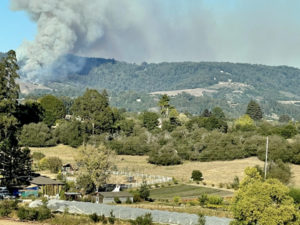 My thoughts snapped into the present when I parked my truck in the yard. A friend dropped by to visit at that moment and he pointed out a wisp of smoke rising out of the forest in the Santa Cruz Mountains just to the north of the farm. Within minutes the wisp had turned into a plume that was rising into the sky. Yikes! And pretty quick there was a spotter plane circling the smoke cloud, and then helicopters and tanker planes laying down retardant. It turns out that the fire was a “control burn” on the Estrada Ranch that turned into an “out of control” burn. I don’t know who permitted the burn, and I can’t imagine what they were thinking.
My thoughts snapped into the present when I parked my truck in the yard. A friend dropped by to visit at that moment and he pointed out a wisp of smoke rising out of the forest in the Santa Cruz Mountains just to the north of the farm. Within minutes the wisp had turned into a plume that was rising into the sky. Yikes! And pretty quick there was a spotter plane circling the smoke cloud, and then helicopters and tanker planes laying down retardant. It turns out that the fire was a “control burn” on the Estrada Ranch that turned into an “out of control” burn. I don’t know who permitted the burn, and I can’t imagine what they were thinking.
Don’t get me wrong- I completely understand the “eco-logic” of control burns. If I could, I’d set fire to the canyon on our farm to reduce fuel, reduce poison oak and eliminate eucalyptus. But I wouldn’t have done it on Friday when it was hot and dry, with a breeze, and when Smokey was saying that fire danger was high. What was the hurry? Luckily, the firefighters were able to control the blaze. Today the typical Sunday calm on the farm was ruffled by the sound of big choppers booming overhead as they dipped water out of neighboring Pinto Lake to haul up and dump on the remaining hot spots. When the water would hit the coals a big puff of steam and ash and smoke would go up that we could see from our kitchen window. And now, ironically, the forecast is for 80% chance of rain starting in about a half hour. We’ll soon see if the meteorologists have made an accurate forecast.
In Mexican Spanish there’s a joke where “meteorologos” are called “mentirologos.” “Mentir” is the verb for “lying” , so they’re the scientific liars, LOL. But whether this evening’s 80% forecast is accurate or not, October is the season when nothing can be taken for granted weather-wise. It could rain, or be hot and dry, or we could get slapped with a sudden frost. Anything goes in the fall and the nights seem suddenly longer. There’s a reason that Fall is the spooky, uncanny season where the rich sweetness of the earth’s bounty is mixed with images and portents of mortality. Winter is approaching.
This week’s harvest box showcases the ambiguity of the seasons. Bright red pomegranates speak to the warm days of summer past that fueled the growth of fruit and filled them with sugar. We still have tomatoes and peppers- it hasn’t rained or frosted yet! But the brassicas, like kale and napa cabbage, speak to the cold tolerant green crops that thrive in the cooler months. And we’ve got the first of the colored daikon that will be bright on the plate even when the sky overhead is dull gray.
I’m pleased that we gathered the Oaxacan Pinto corn in from the field before the rain hits and spoils it. We will offer it on the side over the next couple of weeks. It’s beautiful and ornamental, but you can make purple cornmeal out of it. I’m looking forward to some purple polenta in the weeks to come. If it doesn’t rain then we’ll have one more blast of San Marzano tomatoes before the end of the season. Watch for updates. If you haven’t gotten any tomatoes for winter sauce or you don’t have any time to can, fret not!- our friends at Happy Girl Kitchen put a 1000 pounds of our harvest into jars so we’ll have that available.
Postscript:
It did rain last night- for about seven minutes- and now the dust has settled.The sky is clean, the pumpkins in the little patch by the chicken coop are rinsed clean of dust, and there’s a crispness in the air. But I’ll bet Smokey will still say fire danger is high. We need more than a spit and a drip from Mother Nature to reduce the fire hazard.
Consumer Alert
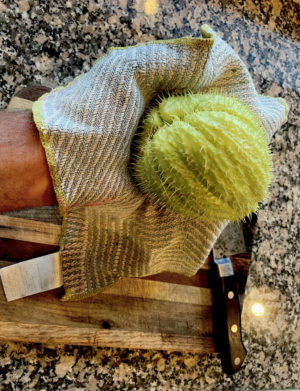
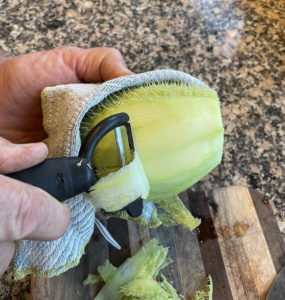 Use a vegetable peeler to remove the spines. Even the spineless ones are best peeled so as to remove the tough hide. Chayotes are in the squash family, but they behave somewhat differently than their zucchini cousins. Once harvested, chayotes can remain happy and healthy sitting in a bowl, not even refrigerated, and the tough hide is part of their strategy. In fact, if you don’t cook your chayote up, eventually a stem will emerge from the bottom of the fruit. You could just pop it into a pot of soil and it will grow into a sprawling, vining, jungly glory in your garden. I provide a frame to control mine.
Use a vegetable peeler to remove the spines. Even the spineless ones are best peeled so as to remove the tough hide. Chayotes are in the squash family, but they behave somewhat differently than their zucchini cousins. Once harvested, chayotes can remain happy and healthy sitting in a bowl, not even refrigerated, and the tough hide is part of their strategy. In fact, if you don’t cook your chayote up, eventually a stem will emerge from the bottom of the fruit. You could just pop it into a pot of soil and it will grow into a sprawling, vining, jungly glory in your garden. I provide a frame to control mine.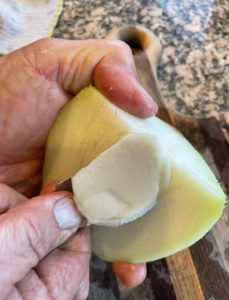 discover the big, fat, immature seed at the heart of the chayote, looking not unlike an avocado pit. Scoop out and discard the seed. Now you can slice the flesh into cubes. Raw, the flavor is not unlike an unripe melon- crispy and almost sweet, like a firm cucumber. You can enjoy the chayote raw in salads, but it is typically cooked. I cooked up mine as though it were zucchini, with some herbal salt, a twist of black pepper, and a squeeze of lime. It came out very nicely as a side dish. There are a lot of Mexican dishes that employ chayote, but I also ordered a chayote dish in a local Chinese restaurant recently just to try it. Because the flavor is mild it can marry with a wide range of flavors.
discover the big, fat, immature seed at the heart of the chayote, looking not unlike an avocado pit. Scoop out and discard the seed. Now you can slice the flesh into cubes. Raw, the flavor is not unlike an unripe melon- crispy and almost sweet, like a firm cucumber. You can enjoy the chayote raw in salads, but it is typically cooked. I cooked up mine as though it were zucchini, with some herbal salt, a twist of black pepper, and a squeeze of lime. It came out very nicely as a side dish. There are a lot of Mexican dishes that employ chayote, but I also ordered a chayote dish in a local Chinese restaurant recently just to try it. Because the flavor is mild it can marry with a wide range of flavors.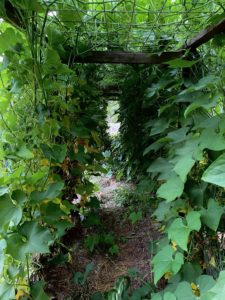 Chayote dishes are traditional in Mexico around the season of the Day of The Dead. The plants will yield a harvest up until the frost comes and kills the green leaves. But even when the vines die back the chayote persists underground. The plant makes a starchy tuber under the ground, much like a potato. The chayote tubers are eaten too, and I look forward to trying one out. Mostly, I’m going to leave my plants’ tubers underground so that the plants have a head start on sprouting next season. Since our planting seems to be a success I’m planning on planting a bunch more next spring. As more chayotes set on the vines this season I’ll select about 60 or so of the fattest ones and save as seedstock for next year. I read that in Mexico it is traditional to plant chayote on the 5th of February. I won’t do that. We’re so much farther north so a frost free planting date for planting will come later. I’ll plant my next crop on April Fool’s Day as the next season in farming gets rolling.
Chayote dishes are traditional in Mexico around the season of the Day of The Dead. The plants will yield a harvest up until the frost comes and kills the green leaves. But even when the vines die back the chayote persists underground. The plant makes a starchy tuber under the ground, much like a potato. The chayote tubers are eaten too, and I look forward to trying one out. Mostly, I’m going to leave my plants’ tubers underground so that the plants have a head start on sprouting next season. Since our planting seems to be a success I’m planning on planting a bunch more next spring. As more chayotes set on the vines this season I’ll select about 60 or so of the fattest ones and save as seedstock for next year. I read that in Mexico it is traditional to plant chayote on the 5th of February. I won’t do that. We’re so much farther north so a frost free planting date for planting will come later. I’ll plant my next crop on April Fool’s Day as the next season in farming gets rolling.The New Abnormal
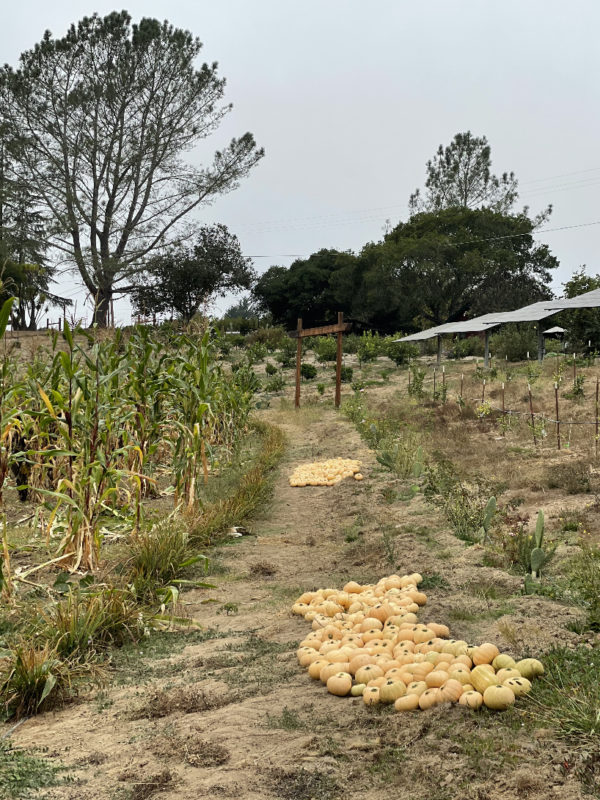
A creeping mist hanging low to the ground kept me from seeing the great V of Canada geese flying overhead last evening but I could hear them honking to one another up and down the line and it reminded me of nature’s timeless patterns and the cyclical drama of the seasons. Fall is upon us. Of course, these Canada geese were probably only migrating from the Spring Hills Golf Course on the north side of the valley off of Casserly Road to the Pajaro Valley Golf Course on Salinas Road on the south side of Watsonville. “Who’s migrating?” they were probably saying. “We like it here.” But the one constant condition in nature is the inevitability of change. Nothing seems “normal” any more.
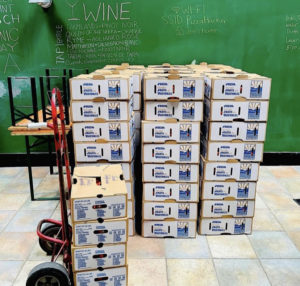 our longtime customers who buy thousands of pounds of dry-farmed Early Girls tomatoes, like PizzaHacker in San Francisco or Happy Girl Kitchen on the Monterey Peninsula had to postpone or cancel some orders because they couldn’t source the jars that they needed for the sauce that they wanted to make. We worked our way through those issues, but now we’re confronting a cardboard crisis. Repeatedly, over the last month or so, Sambrailo, our local packaging supplier has run out of the boxes we need for cherry tomatoes or single layer tomatoes. Imagine a box company with several blocks of empty warehouses and fleets of idle forklifts while meanwhile all the farmers are screaming for cartons. But what can they do? The supply chain is kinked. Everybody is talking. Some folks say it was the ship that ran aground in Suez and blocked the canal that set the problem in motion. Other people say it’s because the paper industry is stymied by lack of workers. Who knows?
our longtime customers who buy thousands of pounds of dry-farmed Early Girls tomatoes, like PizzaHacker in San Francisco or Happy Girl Kitchen on the Monterey Peninsula had to postpone or cancel some orders because they couldn’t source the jars that they needed for the sauce that they wanted to make. We worked our way through those issues, but now we’re confronting a cardboard crisis. Repeatedly, over the last month or so, Sambrailo, our local packaging supplier has run out of the boxes we need for cherry tomatoes or single layer tomatoes. Imagine a box company with several blocks of empty warehouses and fleets of idle forklifts while meanwhile all the farmers are screaming for cartons. But what can they do? The supply chain is kinked. Everybody is talking. Some folks say it was the ship that ran aground in Suez and blocked the canal that set the problem in motion. Other people say it’s because the paper industry is stymied by lack of workers. Who knows?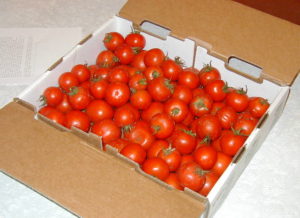
Several restaurants, including Chez Panisse in Berkeley, and Zuni Cafe, Perbacco, and Flour and Water in San Francisco, make a practice of saving nice boxes for us. And both PizzaHacker and Happy Girl Kitchen have been good about returning the tomato cartons, so I think we’re good for getting our tomatoes boxed up, at least until the next cargo of cardboard arrives at the box company. So how much longer will we have tomatoes? Hopefully, all month, but once we’re into Fall the harvest depends on the weather…..and on the vagaries of the mysterious supply chain. How are you doing on jars? If you’ve got the glass and you’ve got the time and if you’ll have the appetite for lovely red sauces this coming winter NOW is the time to get your tomatoes. And a big thanks to all of you who have gotten tomatoes from us this season, and a big thanks to all of you who have made the effort to return us the clean boxes that they came in.


